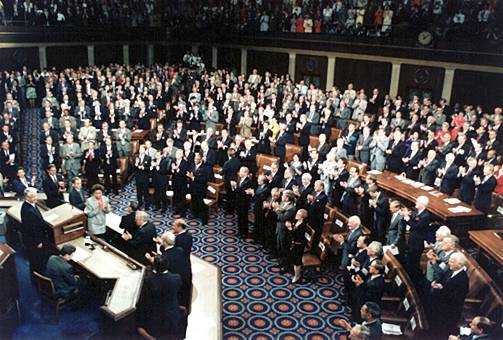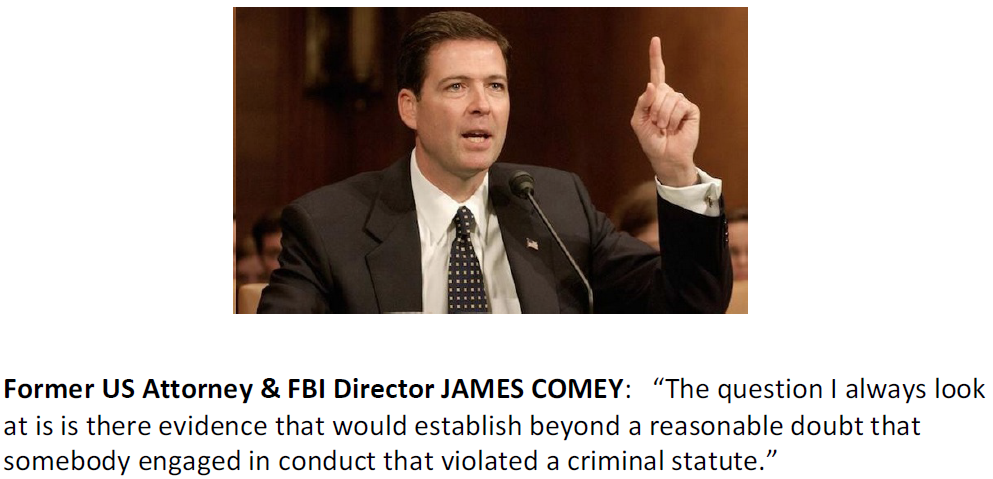


All Are Presumed To Know The Law!

[2] The
people of the State of California are supreme and have the
undoubted right to protect themselves and to preserve the form of
government...
Steiner
v. Darby (1948) 88 Cal.App.2d 481
CALIFORNIA GOVERNMENT CODE
54950 DECLARATION OF LEGISLATIVE PURPOSE.
"In enacting this chapter, the Legislature finds and declares that the
public commissions, boards and councils and the other public agencies
in this State exist to aid in the conduct of the people's
business. It is the intent of the law that their actions be
taken openly and that their deliberations be conducted openly.
The
people of this State do not yield their sovereignty to the agencies
which serve them. The people, in delegating authority, do not
give their public servants the right to decide what is good for the
people to know and what is not good for them to know. The
people insist on remaining informed so that they may retain control
over the instruments they have created".
CONSTITUTION OF
THE STATE OF CALIFORNIA
1849
Art. I
Sec. 2.
All political
power is inherent in the people. Government is instituted for the
protection, security and benefit of the people; and
they have the right to alter or reform the same, whenever the public good may require it.
The "GOVERNMENT" belongs to the
People, not the People's employees.

 "Municipal authorities, as
trustees for the public, ...
Pittsford v. City of
Los Angeles (1942) 50 Cal.App.2d 25
"Municipal authorities, as
trustees for the public, ...
Pittsford v. City of
Los Angeles (1942) 50 Cal.App.2d 25
 THANKFULLY!
THANKFULLY!


The
“Flesch Index”, this is an objective method of measuring the
readability of English text. This index measures the level of
understanding necessary for someone to comprehend the written English
language. The average newspaper is written at a Flesch index
of 7.
The average high school graduate reads and understands at a
level of
10. The average law school grad reads and understands at a level
of
15. The Internal Revenue Code ranks a 31, with some specific
provisions as high as an astounding 55. To further confuse the
issue,
the words used in law have specific legal definitions that are very
different from the common English definitions.
If
the laws that we are to obey, are written at a level that an individual
of average intelligence cannot understand, then perhaps we have reason
to be suspect of the writers' motives. The IRS code is at
31, people
in this country cannot understand at this level, this is more than
twice the level of a law school graduate! What that means is that
even
when you hire a lawyer, he will have trouble interpreting what it
means. The real danger here is, people who are considered
“experts”
on a subject that is beyond your comprehension can mislead and
bamboozle you at will!. How many people have the time, energy,
and
ability to go into a law library and piece this puzzle together?
It
seems that by making the law so difficult to read, the State
Legislature and Congress has effectively removed our access to it.
The
Legislature is presumed to know existing law when it enacts a new
statute, including the existing state of the common law. (See, e.g.,
Keeler v. Superior Court (1970) 2 Cal.3d 619 , 625 [87
Cal.Rptr. 481,
470 P.2d 617, 40 A.L.R.3d 420] ["It will be presumed, of course, that
in enacting a statute the Legislature was familiar with the relevant
rules of the common law."]; People v. Welch (1971) 20
Cal.App.3d 997,
1002 [98 Cal.Rptr. 113] ["It also [67 Cal.App.4th 1501] may be
assumed
that the 1951 amendments were enacted by a Legislature familiar with
its previous acts, existing judicial decisions construing the same, and
the common law rules."]; Schmidt v. Southern Cal. Rapid Transit
Dist.
(1993) 14 Cal.App.4th 23 , 27 [17 Cal.Rptr.2d 340] ["[I]t is
assumed
that the Legislature has existing laws in mind at the time that it
enacts a new statute. (Estate of McDill (1975) 14 Cal.3d 831 ,
837
[122 Cal.Rptr. 754, 537 P.2d 874].)"].)
Arthur
Andersen v. Superior Court (Quackenbush) (1998) 67 Cal.App.4th
1481 , 79 Cal.Rptr.2d 879
[No. B118547. Second Dist., Div. Two. Nov 24, 1998.]
Persons
dealing with a public agency are presumed to know the law and are bound
at their peril to ascertain and follow those procedures necessary to
enter into a binding contract. (See Miller v. McKinnon, supra, 20
Cal.2d at p. 89; Bear River etc. Corp. v. County of Placer (1953) 118
Cal.App.2d 684 , 690 [258 P.2d 543].)
SEYMOUR
v. STATE OF CALIFORNIA, 156 Cal.App.3d 200
[Civ. No. 22606. Court of Appeals of California, Third
Appellate District. March 9, 1984.]
In
Pisani v. Martini (1933) 132 Cal.App. 269, 274 [217 Cal.App.2d
231]
[22 P.2d 804], the court stated: "It [the jury] is not presumed
to know
the law, and if in the absence of instructions it assumes to possess
such knowledge, any attempt to apply it to the facts of the case
constitutes a violation of its duty."
Smith v.
Wemmer , 217 Cal.App.2d 226
[Civ. No. 20817. First Dist., Div. Two. June 17, 1963.]
"Everyone
is presumed to know the law. And all applicable laws in
existence
when an agreement is made necessarily enter into it and form a part of
it as fully as if they were expressly referred to and incorporated in
its terms." (6 Cal.Jur. 310, § 186; Brown v. Ferdon, 5 Cal.2d 226
[54
P.2d 712]; Chapman v. Jocelyn, 182 Cal. 294 [187 P. 962]; Long v.
Newman, 10 Cal.App. 430 [102 P. 534].)
The contracting parties were, therefore, presumed to know all
existing laws...
Robertson
v. Dodson, 54 Cal.App.2d 661
[Civ. No. 12069. First Dist., Div. One. Oct. 2, 1942.]
It may be that citizens must be presumed to know the law.
(See 1 Witkin, Cal. Crimes (1963) § 148, p. 141.)
People
v. Carr (1988) 204 Cal.App.3d 774 , 251 Cal.Rptr. 458
[No. D005459. Court of Appeals of California, Fourth
Appellate District, Division One. September 16, 1988.]
...the
trial court apparently concluded that a police officer is presumed to
know the law relative to the proper procedures to be followed in
effecting a lawful eviction. Even if we assume that a
police officer
is presumed to know the law relative to the eviction of tenants for
nonpayment of rent,...
People
v. Superior Court (1970) 3 Cal.App.3d 648 , 83 Cal.Rptr. 732
[Civ. No. 34858. Court of Appeals of California, Second
Appellate District, Division Two. January 20, 1970.]
...all persons are presumed to know the law including that
which prohibits causing injury or death to another.
People
v. Maynarich, 83 Cal.App.3d 476
[Crim. No. 31052. Second Dist., Div. Five. July 31, 1978.]
...for all persons are presumed to know the law including
that which prohibits causing injury or death to another.
The
court in Poddar noted (p. 758): "The effect, ... which a diminished
capacity bears on malice in a second degree murder-implied malice case
is relevant to two questions: First, was the accused because of a
diminished capacity unaware of a duty to act within the law?
A person
is, of course, presumed to know the law which prohibits injuring
another. Second, even assuming that the accused was aware of
this duty
to act within the law, was he, because of a diminished capacity, unable
to act in accordance with that duty? [Citations; fn. omitted.]
If it is
established that an accused, because he suffered a diminished capacity,
was unaware of or unable to act in accordance with the law, malice
could not properly be found and the maximum offense for which he could
be convicted would be voluntary manslaughter." Thus malice as
the
Poddar court noted is to be properly implied when the killing resulted
from an accident involving a high degree of probability of death and is
accompanied by the requisite mental element. (Id, at p. 759.)
Poddar
fashioned that three-pronged inquiry as the proper procedure requisite
to a finding of malice aforethought. "First, was the act or acts done
for a base, antisocial purpose? Second, was the accused aware of
the
duty imposed upon him not to commit acts which involve the risk of
grave injury or death? Third, if so, did he act despite that
awareness?
The first determination is expressly required in accordance with
the
definition of implied malice, and the second and third determinations
are required relative to the question of 'wanton disregard' also in
accordance with the definition of implied malice." (Id, at pp. 759-760.)
PEOPLE
v. ODOM, 108 Cal.App.3d 100
[Crim. No. 11307. Court of Appeals of California, Fourth
Appellate District, Division One. July 11, 1980.]
"Everyone
is presumed to know the law" (Boehm v. Spreckels, 183 Cal. 239, 245
[191 P. 5]), and defendants herein, who, in the [253 Cal.App.2d
968]
disseminated advertising materials, held themselves out to the public
as experts in the law of trusts, taxation, and probate, are charged
with knowledge of the aforementioned law applicable to such trusts.
Even were defendants not charged with actual knowledge of the
untrue or
misleading nature of the statements relating to the legal consequences
of pure trusts, they, by the exercise of reasonable care, should have
known that the statements were untrue or misleading. The
statements are
made in an absolute, unqualified, and positive manner, and it has been
said (Lerner v. Riverside Citrus Assn., 115 Cal.App.2d 544 , 547
[252
P.2d 744]) that if a person "makes such an absolute, unqualified and
positive statement as implies knowledge on his part, when in fact he
has no knowledge whether his assertion is true or false, and his
statement proves to be false, he is as culpable as if he had wilfully
asserted that to be true which he knew to be false. ..."
People
ex rel. Mosk v. Lynam , 253 Cal.App.2d 959
[Civ. No. 31452. Second Dist., Div. One. Aug. 29, 1967.]
[5]
The guarantee of due process of law includes the requirement of
a
reasonable degree of certainty in legislation. (People v. Superior
Court (Caswell) (1988) 46 Cal.3d 381, 389 [250 Cal.Rptr. 515, 758 P.2d
1046].) To withstand a vagueness challenge, "a statute must be
sufficiently definite to provide adequate notice of the conduct
proscribed. '[A] statute which either forbids or requires the doing of
an act in terms so vague that men of common intelligence must
necessarily guess at its meaning and differ as to its application,
violates the first essential of due process of law. [Citations.]'
[Citations.]" fn. 16 (Caswell, supra, 46 Cal.3d at p. 389.) In
considering whether a legislative proscription is sufficiently clear to
satisfy the requirements of fair notice, we consider not only the
language of the challenged statute, but also its legislative history.
(Walker v. Superior Court (1988) 47 Cal.3d 112, 143 [253 Cal.Rptr. 1,
763 P.2d 852].) "We thus require citizens to apprise themselves not
only of statutory language but also of legislative history ... and
underlying legislative purposes [citation]. [Citation.]" (Ibid.)
People
v. Morse (1993) 21 Cal.App.4th 259 , 25 Cal.Rptr.2d 816
[Nos. A058935, A060033. First Dist., Div. Three. Dec 22,
1993.]
[19]
In considering whether a legislative proscription is
sufficiently clear
to satisfy the requirements of fair notice, "we look first to the
language of the statute, then to its legislative history, and finally
to California decisions construing the statutory language." (Pryor v.
Municipal Court (1979) 25 Cal.3d 238, 246 [158 Cal.Rptr. 330, 599 P.2d
636]; People v. Mirmirani (1981) 30 Cal.3d 375, 383 [178 Cal.Rptr. 792,
636 P.2d 1130].) We thus require citizens to apprise themselves not
only of statutory language but also of legislative history, subsequent
judicial construction, and underlying legislative purposes (People v.
Grubb (1965) 63 Cal.2d 614, 620 [47 Cal.Rptr. 772, 408 P.2d 100]). (See
generally Amsterdam, The Void-For-Vagueness Doctrine in the Supreme
Court (1960) 109 U. Pa. L.Rev. 67.) These principles express the strong
presumption that legislative enactments "must be upheld unless their
unconstitutionality clearly, positively, and unmistakably appears.
[Citations.] A statute should be sufficiently certain so that a
person
may know what is prohibited thereby and what may be done without
violating its provisions, but it cannot be held void for uncertainty if
any reasonable and practical construction can be given to its
language." (Lockheed Aircraft Corp. v. Superior Court (1946) 28 Cal.2d
481, 484 [171 P.2d 21, 166 A.L.R. 701], citations omitted.)
Walker
v. Superior Court (1988) 47 Cal.3d 112
[S.F. No. 24996. Supreme Court of California. November 10,
1988.]
Officer Young ordered Clement’s car towed because he believed
the car was parked in a public lot in violation of the statute.
Even
if the officer is not expected to know the law of all 50 states, surely
he is expected to know the California Vehicle Code...
CLEMENT
v. J & E SERVICE INC., No. 05-56692, March 11, 2008,
UNITED STATES COURT OF APPEALS FOR THE NINTH CIRCUIT
Even
if the officer is not expected to know the law of all 50 states, surely
he is expected to know the California Vehicle Code,...
THE
PEOPLE v. JESUS SANTOS SANCHEZ REYES (2011) 196 Cal.App.4th 856

 UNITED STATES ATTORNEY GENERAL
LORETTA LYNCH
"...look at the statute..."
UNITED STATES ATTORNEY GENERAL
LORETTA LYNCH
"...look at the statute..."
House Judiciary Committee, July 12, 2016



















